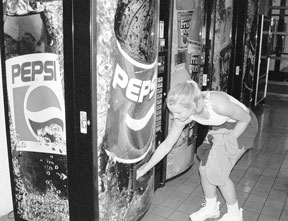Alycia Lamb was disappointed last week when her favorite snack was sold out in one of South Whidbey High School’s vending machines.
“I’ll stop on the way home from school, in case the machine isn’t refilled tomorrow,” she said.
The sophomore first purchased a particular brand of pretzels from the school’s vending machine and declared them “a taste treat and good snack. I probably wouldn’t have noticed them in the store with all the other choices,” Lamb said.
There was a time when the only food available to students during the school day — besides lunch from home — was prepared in the school’s cafeteria. The situation is different now. Students can buy everything from pop and water to sandwiches and pretzels from vending machines placed in South Whidbey schools.
But with all these items come the corporations that sell them. Emblazoned on the sides of the vending machines are the brand names Pepsi and Fruit Works. Outside the school at the baseball and football fields, Pepsi gets more advertising, both at concession stands and on the scoreboards that money from the soft drink giant helped to purchase.
Product branding in schools can include such things as vending machines, advertising posted in hallways, and the promotion of products and movies on free bookcovers.
As the students buy, they are giving their money to the vending machines’ owner — Pepsi Corp. — and to the school district, which has a contract giving it a percentage of the proceeds.
The machines not only provide snacks and drinks, they will also add as much as $10,000 this year to the school’s coffers. It’s revenue that helps pay for the school’s athletic program and student-administered projects.
The school’s principal, Mike Johnson, said he must balance commercialization against the need for the money that vending machines and corporate advertising generate for the school. Companies often compete to place products in front of this captive audience.
Johnson cited an example from his previous school. Another soft drink company, not Pepsi, donated $3,500 annually to the student body budget on top of the proceeds from the machines.
“We are aware that we have a captive audience, so we are careful about how the kids are marketed to,” Johnson said.
The food and drinks the machines hold or that the school makes available at sporting events are in demand. Johnson said it is the school’s job to provide them.
“We want to have the best value for them and provide the goods and services they need,” he said.
The high school contracts with vendors to bring in pop as a convenience and a service to students, school staff and the public during athletic and evening events. The high school has an exclusive contract with Pepsi Corp., which means all machines and products are provided by Pepsi. The eight-year contract period is up next year. The soft drink giant has 12 vending machines in the high school, including nine filled with sodas, one that sells water, one selling juice, and one featuring snacks.
Proceeds from the vending machines at the school go to the Associated Student Body and athletic budgets.
“The profits from the vending machines help out with a number of school programs. The annual take is usually between $8,000 and $10,000,” said Johnson.
Langley Middle School also has a contract with Pepsi for six machines; two pop, two juice, one sports drink and one water.
Tim Gordon, assistant principal at LMS, said he asked for some changes in the vending machine lineup this year.
“This is the third year of the school’s five-year contract with Pepsi. I wanted to see some diversity of product — not just pop — so Pepsi provided the school with juice, water and sports drink machines this year. They also donated our outdoor scoreboard, but it doesn’t have any advertising on it, which is nice.”
Other places where merchants can pitch to students include the high school’s yearbook, a publication that relies on some advertising revenue to pay printing and production costs.
“We do have some local advertising in the yearbook, calendars and daily planners to defray the cost of publishing these items,” Johnson said.
There are some places, however, that are off limits to advertising. Ads do not belong in school hallways or on the jackets of textbooks, he said.
“We do not allow advertising in hallways or accept free products such as bookcovers with advertising. I do receive book covers in the mail with promotion materials on them but don’t distribute them,” he said.
Sophomore Ramona Emerson agrees with school policy.
“I wouldn’t want to see product advertising in the hallways, but vending machines are a necessity, and they don’t affect what I buy away from school. We just get hungry between classes.”



